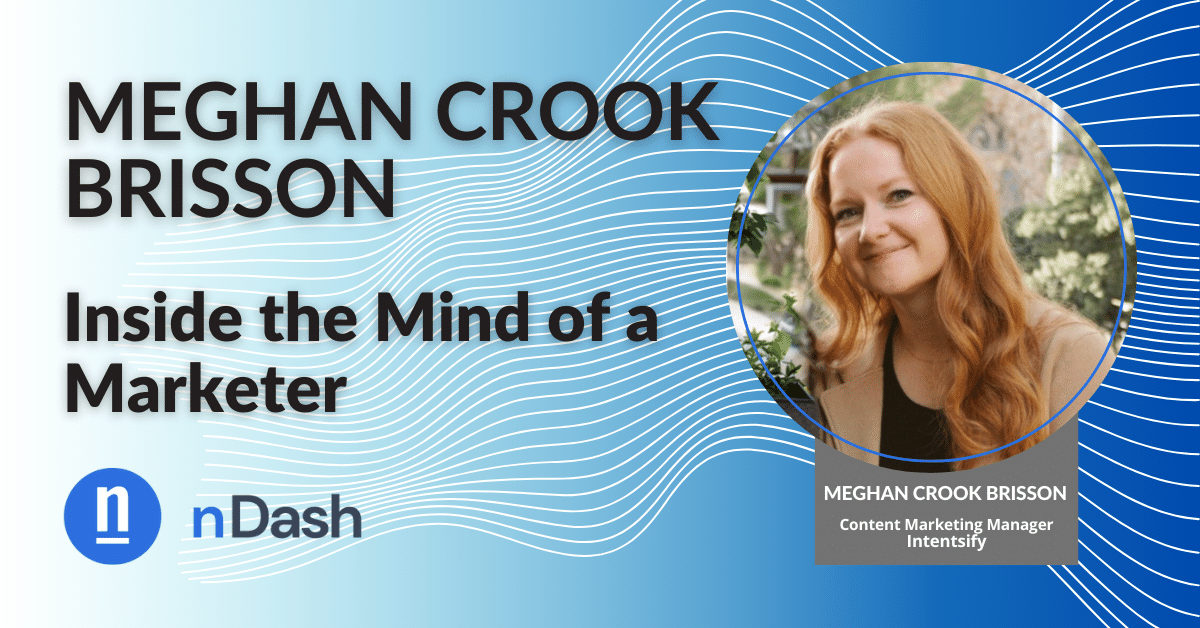We’re back with another marketer interview as part of our “Inside the Mind of a Marketer” series. This time, we’re talking to Meghan Crook Brisson, Intentsify’s content marketing manager, about all things content marketing.
Meghan is a seasoned content marketing leader with over ten years of experience in both B2B and non-profit marketing. Currently, she manages content and communications for Intentsify, a B2B intent data and marketing services company. Her background includes content strategy roles at Tessian, a cybersecurity startup, and GoTo, a B2B SaaS enterprise.
As a skilled content creator and marketer, she crafts engaging content across diverse formats – from informative eBooks and SEO-optimized blogs to captivating multimedia stories told through podcasts and videos. Her passion for content strategy stems from the ongoing challenge of discovering new and innovative ways to connect with target audiences.
nDash’s Interview with Meghan
nDash: To kick things off, Meghan, could you share a bit about your professional journey as a marketer and how it’s influenced your approach to content marketing?
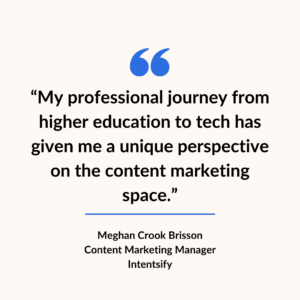 Meghan: Absolutely! My background is somewhat unconventional. I spent the first eight years of my career in higher education marketing, focusing on brand management, content strategy, and creative. Transitioning into the tech space, I’ve worked in both large enterprises and startups. Each shift has taught me valuable lessons, particularly about leveraging experiences from different sectors and adapting quickly.
Meghan: Absolutely! My background is somewhat unconventional. I spent the first eight years of my career in higher education marketing, focusing on brand management, content strategy, and creative. Transitioning into the tech space, I’ve worked in both large enterprises and startups. Each shift has taught me valuable lessons, particularly about leveraging experiences from different sectors and adapting quickly.
[Over time] I’ve really come to appreciate the agility of smaller companies. While large companies provide great learning opportunities and a chance to collaborate with seasoned specialists, the pace and bureaucracy can be quite limiting. In smaller settings, I enjoy the ability to implement and test new ideas quickly without the usual red tape.
My professional journey from higher education to tech has given me a unique perspective on the content marketing space. As a strategic thinker, I’m confident I can adapt my content strategy to any audience or channel. I constantly look for inspiration outside my current industry to help my content stand out.
nDash: Are there any commonalities or differences you’ve noticed in content marketing across different company sizes?
Meghan: Definitely, larger companies often have more layers of approval and slower processes, whereas smaller companies allow for quicker actions and more personal responsibility. Both environments provide learning opportunities, but the dynamics are quite different.
Due to their complex organizational structures, large companies have more comprehensive strategic planning and a tendency for slower execution. This fosters a detailed, often meticulous approach to content creation, where alignment with broader corporate goals is tightly managed. The advantage here is that one can leverage vast resources and expertise, but the downside can be less flexibility and a slower response to market changes.
On the other hand, smaller companies usually have a much more dynamic environment, with fewer bureaucratic hurdles to clear for content approval and implementation. This leads to a faster pace of content production and the ability to quickly adapt to new trends or feedback. While resources might be more limited in these settings, the ability to experiment and iterate rapidly often leads to innovative content strategies that can be highly responsive to the audience’s needs.
nDash: How have you integrated AI into your current marketing strategies?
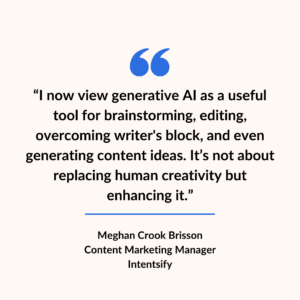 Meghan: Initially, I was quite skeptical about AI in marketing because I think people were talking about it in the wrong way. Friends and colleagues assumed my job would be replaced by robot writers. I now view generative AI as a useful tool for brainstorming, editing, overcoming writer’s block, and even generating content ideas. It’s not about replacing human creativity but enhancing it.
Meghan: Initially, I was quite skeptical about AI in marketing because I think people were talking about it in the wrong way. Friends and colleagues assumed my job would be replaced by robot writers. I now view generative AI as a useful tool for brainstorming, editing, overcoming writer’s block, and even generating content ideas. It’s not about replacing human creativity but enhancing it.
I’ve leveraged tools like ChatGPT, Jasper, and others to streamline processes and inspire creativity in our campaigns. These tools assist us in generating content ideas, crafting initial outlines, and even suggesting headlines, which significantly speeds up the content creation process. That’s been particularly helpful in filling content gaps more efficiently.
Now the impact of AI in marketing goes far beyond ChatGPT and genAI. For example, Intentsify’s AI technology allows marketers to turn intent data into leads. Intentsify’s platform algorithm scores and ranks targeted accounts to ensure content syndication and digital ad solutions are served to accounts showing the highest level of relevant research activities. AI-driven platforms like Intentsify help marketers reach prospects at the right time with the right message — a content marketer’s dream.
nDash: What are the main challenges in content production at your current company?
Meghan: The biggest challenge is balancing the desire to produce large amounts of high-quality content with limited resources, especially in smaller teams. Educating our team about the strategic value of content and managing expectations around the time-intensive nature of creating quality content is a continuous challenge.
To address this, we prioritize projects based on their potential impact and alignment with our integrated marketing campaigns. For example, the greatest ebook ever written will only be successful if it’s distributed effectively in the market. Campaign alignment ensures we have the appropriate budget for paid channels and that all creative deliverables in the campaign will be consistent across message and design.
In tackling these challenges, we’ve found great support in platforms like nDash. nDash offers a robust network of freelance content creators who can supplement our internal capabilities. By collaborating with skilled freelancers, we can scale our content production flexibly and efficiently, ensuring that we meet our content goals without compromising on quality.
nDash: As a marketer, how do you approach content distribution?
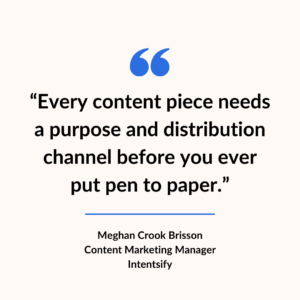 Meghan: In my earlier career, I adhered to the belief that “content is king.” However, experience and insights from a compelling newsletter article taught me that strategic distribution is crucial. At larger companies, I witnessed firsthand the pitfalls of not having a cohesive strategy for content distribution. High-quality eBooks, whitepapers, and blog posts often fail to reach their full potential due to inadequate distribution and misalignment with audience needs and stages in the buyer’s journey.
Meghan: In my earlier career, I adhered to the belief that “content is king.” However, experience and insights from a compelling newsletter article taught me that strategic distribution is crucial. At larger companies, I witnessed firsthand the pitfalls of not having a cohesive strategy for content distribution. High-quality eBooks, whitepapers, and blog posts often fail to reach their full potential due to inadequate distribution and misalignment with audience needs and stages in the buyer’s journey.
Now, at a smaller company, I can apply a more hands-on approach to where and how we distribute content. We leverage our content syndication service to extend our reach without incurring high costs. We also critically evaluate all channels—from email nurtures to paid ads and partnerships with third-party communities—to ensure that each piece of content is purposefully placed to effectively engage our specific audience. On our blog, for example, instead of arbitrarily pumping out blog posts, I advocate for fewer, well-researched and optimized posts that can improve our rankings and visibility. Every content piece needs a purpose and distribution channel before you ever put pen to paper.
nDash: What are your thoughts on podcasts in the content marketing space?
Meghan: Podcasts are a unique medium that, if used correctly, can effectively engage niche audiences. As of now, though, I would advise against starting a corporate podcast for most B2B scenarios. Back in 2018, I started the Northeastern Next alumni podcast. Podcasts were brand new in that space, and everyone was excited to listen. That’s not the case today in the B2B world, and building a net new audience would be a major hurdle.
The most successful B2B podcasts I’ve come across feel more brand agnostic, such as the B2B Growth Show. These podcasts thrive because they don’t come across as advertisements. They focus on real-world issues and strategies, which lends them an air of authenticity and makes them a valuable resource for professionals seeking to enhance their knowledge and skills.
Podcasts can be great for thought leadership and reaching specific audiences. But for most B2B companies, there are better ways to go. Webinars are a classic for engagement and lead generation, and short videos on LinkedIn are a hot new way to grab the attention of busy professionals. I also would spend more time getting guest spots on established podcasts over starting a new show from scratch.
The bottom line? Think before you podcast. It can be a great way to get your name out there and be seen as a leader, but don’t expect it to be your lead machine.
nDash: As we wrap up, do you have any final thoughts or advice for those looking into content marketing and becoming a marketer?
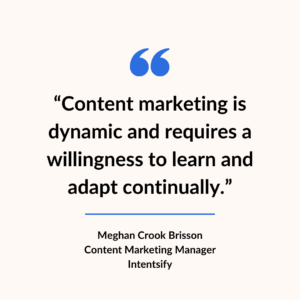 Meghan: Content marketing is dynamic and requires a willingness to learn and adapt continually. It’s about understanding your audience deeply and crafting messages that resonate. Always be ready to test new ideas, measure their impact, and iterate based on data. It’s a thrilling field for creative and analytical people.
Meghan: Content marketing is dynamic and requires a willingness to learn and adapt continually. It’s about understanding your audience deeply and crafting messages that resonate. Always be ready to test new ideas, measure their impact, and iterate based on data. It’s a thrilling field for creative and analytical people.
Always be ready to adapt and innovate. Marketing is constantly changing, with new platforms, technologies, and audience behaviors emerging regularly. Keeping abreast of these changes and being willing to experiment with new content forms or distribution channels is key to staying relevant and effective.
Measure everything. The beauty of digital content marketing is its measurability. Use data to guide your decisions, from content creation to distribution strategies. Analytics can tell you what’s working and what isn’t, allowing you to iterate and improve continuously.
Finally, never underestimate the power of storytelling. Even in B2B marketing, where the content can become quite factual and feature-driven, the stories that connect on a human level are those that are remembered and shared. Aim to infuse your content with narratives that engage your audience emotionally and intellectually.
Content marketing is a dynamic field that requires a balance of creativity, strategic thinking, and data-driven insights. Embrace these aspects, and you’ll be well on your way to success in this exciting industry.
Want to learn more from Meghan’s career as a content marketer? Visit her LinkedIn profile to connect or follow her for more updates.
